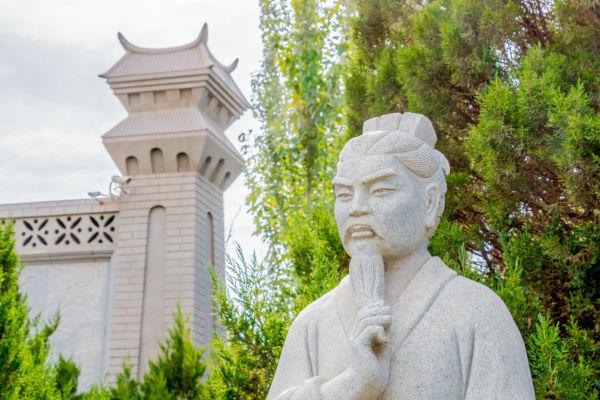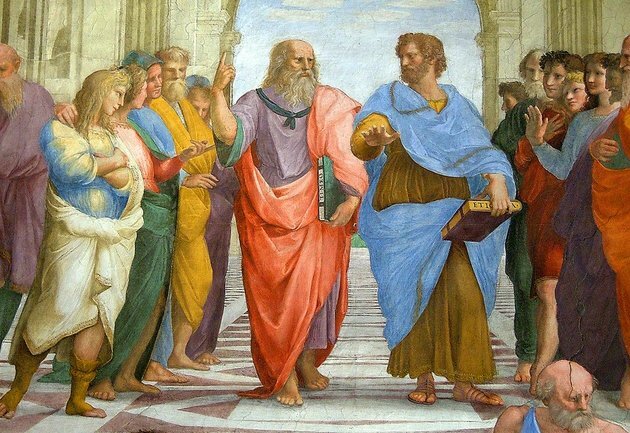It is not known for sure if the Philosophy it has about 2600 or 5000 years of tradition. If we consider the influence of Egyptian thought on peoples greeks, Philosophy may be over 3000 years old and, if we consider that there was already a production of a type of philosophical thought in Far East, the first root of Philosophy that can be identified in the ancients buddhist teachings it is already over 5,000 years of existence.
It is a fact that Philosophy is a form of thoughtorganized,conceptual and that has the ability to move its own thinking through the identification and formulation of problems, that is, Philosophy is, by nature, problematizer, avoiding providing ready answers to the questions raised and creating new questions, new questions and new problems that make thought never cease its cycle of existence.
No matter, for now, its right origin, the important thing is to know that there is no single, definitive answer to the question "what is philosophy?". Different philosophers, in different places and at different times, have answered this question, not necessarily in an explicit way. Many have done it through practice (doing their philosophies), each in their own way.
for the greeks pre-Socratic, Philosophy was a rational way of investigating the origin of the universe through the formulation of theories that were often contrary to the claims of myths. For Socrates, Philosophy would be a look inside oneself and a way to extract the true ideas about what human beings themselves have developed through the creation of societies.
To the hellenists, Philosophy was a kind of life practice to achieve fullness and happiness. To the medieval, Philosophy would be submitted to Theology, and the infinite wisdom of God would have given the human being the possibility of rational knowledge.
already the modern turned to the question of knowledge and of the science, Besides the politics and of the ethic, developing a thought that rescued certain characteristics of the Greeks, but improved them. already in contemporaneity, Philosophy embraced new problems, characteristic of our time, to develop newproblems and newconcepts about them.
Also access:Also know the history of Literature
Do not stop now... There's more after the advertising ;)
Philosophy concept
It is not possible to present a ready, definitive and final answer to the question about the essence of Philosophy. What we will present here will be an attempt to answergeneric, but that does not fail to depart from certain points of view that can be applied in certain circumstances.
Philosophy is a branchofto know that seeks to understand the concepts or the essences of everything that exists in the world, thus creating the Definitionsconceptual. The concepts, which are born from those definitions, are, in turn, complex meanings that move problems. You problems they are also processes by which philosophy works.
A problem, a question, a question is a process that seeks to find a definition about something. Asking "what is it?", "how is it?" or "why is it?" is to formulate a problem, and to answer that question is to create a concept. Therefore, asking what philosophy is is a philosophical attitude.
contemporary philosophers GillesDeleuze and FelixGuattari, who wrote a book titled What is Philosophy?, stated, in response, that "philosophy, more rigorously, is the discipline that consists of to createconcepts"i, that is, it is an area of knowledge that is dedicated to creating, shaping, formulating and reformulating Meanings to the world.
Working with that opposition that the ancient Greeks tried to make between mythology and reason (which does not represent a radical break from one to the other), Philosophy would be a new way of creating meanings for the world, moving awayof thatmodereligious of thinking about the world itself. Philosophy would be, according to philosophers, a way of creating mechanisms (which they called devices) that provide a first capacity for understanding the world.
In another writing, this feat in the company of the journalist Claireparnet,Deleuze says:
"the concepts are exactly like sounds, colors or images, they are intensities that suit them or not, that pass or do not pass"ii.
Thus, the conceptsthey arecreations which, like objects, have a existencedefined and marked in the world.
Marilenachaui, Professor Emeritus of Philosophy at USP, says that philosophical activity comes to call into question our customary beliefs. This means that, just as Socrates intended in antiquity, Philosophy is a time when we stop and think if what we normally do, believe or see is true.
This moment, the apex of philosophical thought, is, According to Chauiiii, a moment of crisis, in which our customary beliefs, always taken as true, are questioned, put on hold by the doubt.
What does Philosophy study?
Today, especially in Brazil, several higher courses in Philosophy offer training aimed, in general, for the history of philosophy, that is, philosophers and Philosophy teachers in training study the productionFromthinkersalreadyconsecrated as canons of the world intelligentsia.
This conception clashes with the conception of several scholars in the teaching of Philosophy and philosophical methodology who claim that one only learns to philosophize by philosophizingiv. In this sense, we can distinguish two variants of philosophical study: one focused on HistorygivesPhilosophy, which is dedicated to analyzing the canonical production of world philosophical thought, and another that aims at apprenticeshipof themethodologiesphilosophical, which does not dispense with the understanding of the History of Philosophy.
In short, we can say that Philosophy, to take a reference in Deleuze, it is a study of concepts. already stop Kant, Philosophy is a way to establish a criticismofknowledge. For ancient philosophers, like Socrates, and modern, like Discards, philosophical knowledge must be done through a search, often strict, by Definitionspure and immutable who are looking for a truthuniversal.
while it stops Nietzsche, contemporary philosopher, there are no universal truths, but there are perspectives and genealogies that shape what we call the truth. For thinkers who have dedicated themselves to studying the theory of knowledge, Philosophy must seek to understand how is understanding possible.
for the metaphysicians, Philosophy would be the search for “being” and by the “essences” of things. For Political Philosophy, philosophical thinking must address real world issues that concern politics, ethics and life in society.
So, as said, it is impossible to provide a ready and definitive answer on what philosophy is. At this point, we also add that the field of action of philosophers is vast, with no single activity that cannot be considered as a philosophical activity.
Know more:Get to know this theory of Plato that is so important for our communication
Origins of Philosophy
There is no ultimate and final consensus on the origin of Philosophy. What most historians of philosophy claim is that this origin would be in Greece, with Miletus Tales, around the year 2585 BC. Ç. However, even if this statement has its reasons for existing (the Greek Philosophy may not have been the first philosophical production, but it was different from everything that came before it), it does not contemplate the fact of what Egyptians,Hindus and Chinese they had already produced something similar to what we call Philosophy.
If we expand the concept beyond what we usually understand by Philosophy, we can say that the precepts buddhists and Taoists they had already formed a philosophical thought. This time, thinkers who inhabited the Far East, previous or contemporary to the first philosophers, such as mozi and Lao Tzu, they left records of what appears to be a philosophical production as authentic as Western production.
Marilena Chaui attests to this thesis, saying that it is not absurd to think about this relationship and, in fairness, to recognize traits that influenced the Greeks to do what they did more than 2600 years agov.

Sculpture by Confucius, Chinese sage from the 6th century BC Ç. who formulated philosophical and moral doctrines.
It is noteworthy that the statement that Philosophy has its origins in Greece can be adopted, provided that there are reservations. First, it must be considered that there was a productionphilosophicalEastern and that this production influenced Greeks like Thales (who knew Babylonian and Egyptian culture). Secondly, it must be considered not that there is a Greek exclusivity, but that there was a different way, on the part of the Greeks, in dealing with the Philosophy in question.
Therefore, we can say that the Philosophy western had its origin in Greece, with Tales. The term was developed later, by Pythagoras of Samos, who chose the Greek words philia (love or friendship) and sophia (wisdom) to form the word philosophy (friend or lover of wisdom). Thales did not recognize that he was doing something unheard of in the West and that his name would go down in history. It was just Aristotle, around 200 years later, who ranked him as the first philosopher.
What is Philosophy for?
A difficult question to answer. We can say, first hand, that Philosophy no use. Does this statement seem strange? At first yes. If we take into account that the term utility, in our contemporary vocabulary, refers to something that modifies the means, which creates something concrete and which, in the first place, has a monetary value, so, yes, Philosophy does not have utility.
Philosophy, according to Chaui, does not show concrete results, visible and capable of changing the world immediately. Therefore, the question "What is Philosophy for?" it is constant, as its usefulness is perceived little by little and through a complex exercise of abstraction.
chaui it also states a first answer, ironic as well as the question when asked by malicious people: “philosophy is a science with which and without which the world remains as it is.saw", i.e, philosophy is useless.
In a sense, that is, from the pragmatic point of view of utility, which claims to be useful that which modifies the environment with a concrete intervention, the Philosophy is useless. We can also say that Philosophy does not serve anything, does not serve anyone, because Philosophy, from its origin, searchproblematize and to question. In this sense, slowly and laboriously, Philosophy is showing its usefulness: to put thought in motion, to question and, why not, to annoy.
According to Deleuze,
philosophy serves neither the State nor the Church, which have other concerns. It serves no established power. Philosophy is meant to be sad. A philosophy that saddens no one and does not upset anyone is not a philosophy. Philosophy serves to harm foolishness, makes foolishness shameful. It has no other purpose than the following: to denounce the baseness of thought in all its formsvii.
Philosophy serves itself, as an artisan and constant moverofthought. It serves to question, problematize and annoy. serves for conceptualize. Philosophy denounces foolishness for being itself a lover of wisdom who will never accept vulgar ignorance as something normally bearable.
iDELEUZE, G.; GUATTARI, F. What is philosophy? Translated by Bento Prado Jr. and Alberto Alonso Muñoz. Rio de Janeiro: 34, 1992, p. 13.
iiDELEUZE, G.; PARNET, C. Dialogues. Trans. by Eloisa Araújo Ribeiro. São Paulo: Listen, 1998, p. 11.
iiiCHAUI, M. Invitation to Philosophy. São Paulo: Attica, 2005.
ivPALACES, G. THE. One teaches to philosophize by philosophizing. In: Philosophers, vol. 12, no. 1. Goiânia: UFG, 2007, p. 79-90.
vCHAUI, M. Introduction to the History of Philosophy: from the Presocratics to Aristotle. 2nd ed., revised and expanded. São Paulo: Companhia das Letras, 2011, vol. 1, p. 20.
sawCHAUI, M. Invitation to Philosophy. São Paulo: Attica, 2005, p. 19.
viiDELEUZE, G. Nietzsche and Philosophy. Translation by Ruth Joffily Dias and Edmundo Fernandes Dias. Rio de Janeiro: Editora Rio, 1976, p. 87.
by Francisco Porfirio
Philosophy teacher

